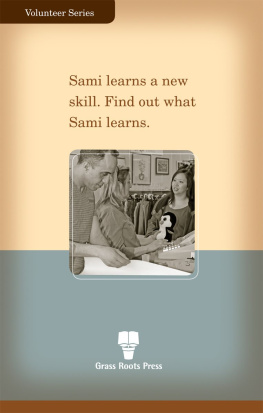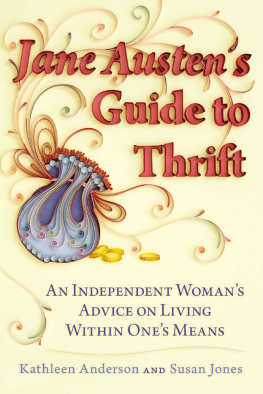Thrift
Thrift
A Cyclopedia

BEING AN EARLY ATTEMPT TO ASSEMBLE THE BEST OF WHAT IS KNOWN FROM HISTORY AND LITERATURE ABOUT ONE OF OUR MOST PROVOCATIVE WORDS  FOR THOSE WHO ARE NOT ASHAMED TO THINK ANEW ABOUT HAPPINESS,
FOR THOSE WHO ARE NOT ASHAMED TO THINK ANEW ABOUT HAPPINESS,
EXTRAVAGANCE, AND THRIVING

David Blankenhorn
T EMPLETON F OUNDATION P RESS
WEST CONSHOHOCKEN, PENNSYLVANIA

A COMPANION TO THE TRAVELING EXHIBITION, THRIFT: IN SEARCH OF THE ART OF LIVING WELL, AND THE REPORT TO THE NATION, FOR A NEW THRIFT: CONFRONTING THE DEBT CULTURE. VISIT THE WEBSITE: WWW.NEWTHRIFT.ORG

Templeton Foundation Press
300 Conshohocken State Road, Suite 670
West Conshohocken, PA 19428
www.templetonpress.org
2008 by the Institute for American Values
All rights reserved. No part of this book may be used or reproduced, stored in a retrieval system, or transmitted in any form or by any means, electronic, mechanical, photocopying, recording, or otherwise, without the written permission of Templeton Foundation Press.
Templeton Foundation Press helps intellectual leaders and others learn about science research on aspects of realities, invisible and intangible. Spiritual realities include unlimited love, accelerating creativity, worship, and the benefits of purpose in persons and in the cosmos.
Designed and typeset by Gopa & Ted2, Inc.
Printed in the United States of America
08 09 10 11 12 13 10 9 8 7 6 5 4 3 2 1
Library of Congress Cataloging-in-Publication Data
Blankenhorn, David.
Thrift : a cyclopedia: being an early attempt to assemble the best of what is known from history and literature about one of our most provocative words for those who are not ashamed to think anew about happiness, extravagance, and thriving / David Blankenhorn.
p. cm.
A Companion to the traveling exhibition, Thrift: In Search of the Art of Living Well and the Report to the Nation, For a New Thrift: Confronting the Debt Culture.
Developed after a conference of scholars the author convened in October of 2005, at the request of the John Templeton Foundation, to discuss the history of thrift as an American value and practice.
Includes bibliographical references.
ISBN -13: 978-1-59947-142-6 (pbk. : alk. paper)
ISBN -10: 1-59947-142-6 (pbk. :alk. paper)
Ebook ISBN : 978-1-59947-229-4
1. Consumption (Economics)Social aspectsUnited States. 2. Saving and investmentUnited StatesUnited States. 3. Social valuesUnited StatesHistory. 4. Conduct of lifeUnited StatesHistory. 5. Social valuesUnited StatesQuotations, maxims, etc. I. Title.
HC110.C6B57 2008
332.0240097303dc22
2008006962
For Arthur and Joann Rasmussenthrivers who help others to thrive
.
If a good man thrive, all thrive with him.
George Herbert

Introduction

T HIS BOOK is an extended reflection, and a preliminary bringing together of knowledge, on the English word thrift. In October of 2005, at the request of the John Templeton Foundation, I helped to convene a conference of nearly forty leading scholars to discuss the history of thrift as an American value and practice. The main thing I learned at the conference is that most leading scholars are not very interested in thrift. Moreover, among those who are interested, thrift is usually viewed as either mildly amusing, worrisomely retrograde, or both.
The very word thrift tells its own tale, being derived from the word to thrive.
JOHN LUBBOCK, THE USE OF LIFE, 1894
A prominent professor of political philosophy from Harvard, who adamantly insisted that thrift is not a virtue, and whose commissioned paper did not contain even one mention of the word thrift, asked me pointedly: Are you saying that the word thrift has to be on every page? I told him Id think about that.
So I went home and thought about it. I eventually decided that the answer to his question is Yes. A serious paper on the topic of thrift ought to contain the word thrift on every page. Or nearly every page. Or at least on one or two pages! This book contains the word thrift on nearly every page.
Im grateful to that Harvard professor, because that conference, and in particular his question, greatly deepened my interest in the subject. What was this odd idea that they could barely be bothered to study and so clearly did not believe in? Moreover, the whole experience of that conference made me realize that leading scholars are not the only ones today who are actively disinterested in thrift. The word thrift has largely fallen out of our public conversation. As a result, the whole concept sounds quaintly old-fashioned, like something your great-grandparents might have talked aboutbut not you, and certainly not your children. I began to wonder, why is this the case? Whats the real story behind this funny little word that so many people cant or dont want to say?
- a. The fact or condition of thriving or prospering; (obsolete)
b. Means of thriving;
c. Prosperous growth, physical thriving;
d. Growing-pains. - a. Savings, earnings, gains, profit;
b. That which is saved (of something); (obsolete) - a. Economical management, economy;
b. A U.S. savings and loan association.
THRIFT, OXFORD ENGLISH DICTIONARY
To pursue the answer to this question, I needed a research methodology. I decided, for lack of a better idea, to keep it simple. Following the implicit guideline contained in the question posed by my irritated Harvard mentor, I began to search everywhere for phrases, sentences, and pages that contained the word thrift. I confess that I began with Bartletts Familiar QuotationsI knew I could find a few there! It also turns out that, unlike todays leading scholars, Shakespeare liked the word quite a bit. So did Chaucer before him. In fact, amazingly enough, so have many of the English-speaking worlds most prominent writers and leaders! Over the centuries, thrift has been repeatedly, passionately, and articulately advocated. It has also been repeatedly, passionately, and articulately denounced. Both proponents and advocates typically agree that thrift is a big idea, with high stakes for individuals and society.
Somewhere in all of my note taking, I became a genuine thrift nut. I believe in it passionately. Im a starry-eyed advocate. For so many of the problems now ailing usfrom shameful wastefulness, to growing economic inequality, to independence-killing indebtedness, to runaway mindless consumerismI believe that the philosophy of thrift is the closest thing we have to a miracle cure. As a result, I want to testify about it. I want to shout it from the rooftops. I want to convert people. And I hope that after you read this book, you will want to do the same.
However, except for an occasional editorial or attempt to clarify the narrative, I myself dont have much to say in this book. The reason is not laziness. Its thrift! First, the way to understand thrift is to get as close to it as possible. As a result, reading what I say about Benjamin Franklins view of thrift is not nearly as instructiveor as fun!as reading what Franklin himself says about thrift. No view of mine about the U.S. Savings and Loan League circa 1965 could ever be as revealing, or as interestingly expressed, as the view of the guy who served as president of the League in 1965 and therefore gave the keynote address at the Leagues 1965 annual convention. Learning what I conclude about thrift-boxes is not as good as actually seeing a thrift-box. (Thats why this book has lots of visual images.)
Next page









 FOR THOSE WHO ARE NOT ASHAMED TO THINK ANEW ABOUT HAPPINESS,
FOR THOSE WHO ARE NOT ASHAMED TO THINK ANEW ABOUT HAPPINESS, Introduction
Introduction